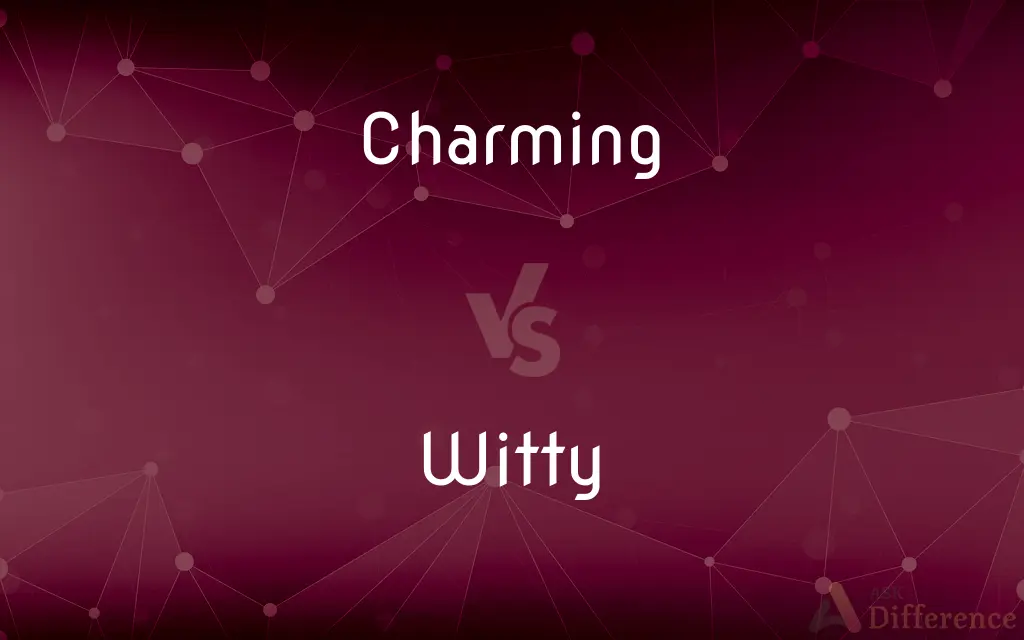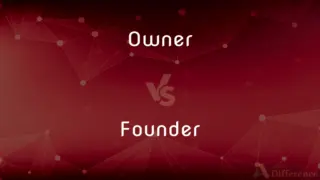Charming vs. Witty — What's the Difference?
By Maham Liaqat & Fiza Rafique — Updated on March 20, 2024
Charming is about a delightful and appealing nature, whereas witty involves clever humor and quick thinking.

Difference Between Charming and Witty
Table of Contents
ADVERTISEMENT
Key Differences
Charming often implies a pleasant and attractive personality that draws others in. People find a charming person's company enjoyable because of their demeanor and way of interacting. On the other hand, witty refers to someone who can deliver humorous or insightful comments quickly and cleverly. Wit involves a sharp intellect and a keen ability to observe and articulate amusing or intriguing observations in a conversation.
While charming individuals might use their graciousness and likability to influence or entertain, witty people rely on their mental agility and linguistic skills to engage others. Charming people might not always be funny, but they possess an aura that makes them likable and captivating. Whereas, witty individuals might not always be seen as universally likable, but their cleverness can make them compelling and entertaining to those who appreciate quick humor.
Charming people often excel in social situations because their warmth and affability put others at ease. Their charm can be seen as an innate quality that endears them to people, making social interactions smooth and enjoyable. Witty individuals, however, may shine in conversations that value intellect and humor, using their sharp minds to navigate through discussions with ease and humor.
The appeal of charming individuals often lies in their ability to make others feel valued and at ease, creating a positive and inviting atmosphere. Their charm can be subtle and woven into their everyday interactions, making them consistently pleasant to be around. In contrast, the allure of witty people lies in their ability to surprise and delight with their quick thinking and clever remarks, which can make conversations with them lively and unpredictable.
Charm can be seen as a more universal and timeless quality, often associated with good manners, kindness, and considerate behavior. It's a trait that can be appreciated in any context and by people of all ages. Wit, however, often requires a certain level of cultural or contextual knowledge to fully appreciate, making it more specific to certain audiences or situations.
ADVERTISEMENT
Comparison Chart
Definition
Pleasantly attractive
Clever and quick in humor
Key Quality
Affability and likability
Intellect and humor
Social Impact
Puts others at ease
Engages through humor
Appeal
Universal and timeless
Specific to certain audiences
Conversation
Smooth and enjoyable
Lively and unpredictable
Compare with Definitions
Charming
Possessing an appealing and delightful quality that attracts others.
His charming smile won over the entire audience.
Witty
Displaying a quick and inventive verbal humor.
His witty remarks kept the conversation lively and entertaining.
Charming
Often involves a gentle and understated approach to engaging with others.
The actor's charming presence made the interview feel more like a friendly chat.
Witty
Engages and entertains through cleverness and quick thinking.
His witty banter made him the life of the party.
Charming
The ability to make others feel comfortable and positive through personal interaction.
Her charming manner made her popular among her peers.
Witty
Often unexpected, making humor more impactful and memorable.
The playwright's witty dialogue added a dynamic layer to the characters.
Charming
Maintains a likable demeanor in various situations, making social interactions consistently pleasant.
Despite the pressure, she remained charming throughout the negotiation.
Witty
Involves a sharp mind and a keen observation of one's surroundings to craft clever comments.
Her witty comeback left everyone in stitches.
Charming
Creates a warm and inviting atmosphere, making people feel valued and at ease.
The host's charming attitude set a welcoming tone for the evening.
Witty
Requires a certain level of understanding or knowledge to fully appreciate the humor.
The scientist's witty explanation made the complex topic accessible and fun.
Charming
Very pleasant or attractive
A charming country cottage
Witty
Showing or characterized by quick and inventive verbal humour
Marlowe was charming and witty
A witty remark
Charming
Used as an ironic expression of displeasure or disapproval
‘I hate men.’ ‘Charming!’ he said
Witty
Demonstrating wit in expression, especially in speech or writing; clever and humorous
A witty commentator on the political scene.
Charming
Having the power or quality of pleasing or delighting
A charming cottage.
Witty
Characterized by or having the nature of wit; funny or jocular
A witty saying.
Charming
Fascinating or delightful; very likeable
A charming young man.
Witty
Entertainingly and strikingly clever or original in concept, design, or performance
A witty sculpture.
Witty choreography.
Charming
Pleasant, charismatic.
Witty
(obsolete) Wise, having good judgement.
Charming
Delightful in a playful way which avoids responsibility or seriousness, as if attracting through a magical charm.
Witty
(archaic) Possessing a strong intellect or intellectual capacity; intelligent, skilful, ingenious.
Charming
Present participle of charm
Witty
Clever; amusingly ingenious.
His speech was both witty and informative.
Charming
The casting of a magical charm.
Witty
Full of wit.
His frequent quips mark him as particularly witty.
Charming
Pleasing the mind or senses in a high degree; delighting; fascinating; attractive.
How charming is divine philosophy.
Witty
Quick of mind; insightful; in possession of wits.
She may have grown older, but she has grown no less witty.
Charming
Pleasing or delighting;
Endowed with charming manners
A charming little cottage
A charming personality
Witty
Possessed of wit; knowing; wise; skillful; judicious; clever; cunning.
Charming
Possessing or using or characteristic of or appropriate to supernatural powers;
Charming incantations
Magic signs that protect against adverse influence
A magical spell
'tis now the very witching time of night
Wizard wands
Wizardly powers
Witty
Especially, possessing wit or humor; good at repartee; droll; facetious; sometimes, sarcastic; as, a witty remark, poem, and the like.
Witty
Combining clever conception and facetious expression;
His sermons were unpredictably witty and satirical as well as eloquent
Common Curiosities
Can a person be both charming and witty?
Yes, it's possible for someone to be both, combining the appeal of charm with the clever humor of wit.
How do charming individuals handle conflicts?
They often use their affability and diplomacy to defuse tensions and find amicable solutions.
Can wit be offensive?
If not used carefully, wit can sometimes come off as sarcastic or offensive to some.
What makes someone charming?
Charm involves a pleasant and attractive personality that naturally draws people in.
How does wit differ from just being funny?
Wit involves cleverness and quick thinking in humor, whereas being funny might not require quick intellect.
Do witty people always intend to be humorous?
Not always; sometimes wit is used to make insightful observations, not just for humor.
Is charm inherent or can it be developed?
While some aspects of charm may be inherent, many can be developed through social skills and empathy.
Is charming considered a universal quality?
Charm is often seen as a universal quality because it is based on likability and affability.
Does wit require a specific audience to be appreciated?
Yes, wit often requires an audience that understands the context or cultural references.
Can charm be misleading?
Charm can sometimes be used to manipulate, so it's important to discern genuine charm from deceitful charm.
Is wit more valued in certain cultures or contexts?
Yes, wit is particularly valued in cultures and contexts that appreciate intellectual humor and quick thinking.
How do witty people contribute to conversations?
They add humor and insight, making discussions more engaging and memorable.
Is being charming beneficial in professional settings?
Yes, being charming can enhance interpersonal relations and facilitate networking in professional settings.
How can one develop wit?
Wit can be developed through reading, observing, practicing humor, and engaging in intellectual discussions.
Can charm wear off over time?
If charm is not backed by substance, it might lose its effect as people seek deeper qualities.
Share Your Discovery

Previous Comparison
Buyed vs. Buyer
Next Comparison
Owner vs. FounderAuthor Spotlight
Written by
Maham LiaqatCo-written by
Fiza RafiqueFiza Rafique is a skilled content writer at AskDifference.com, where she meticulously refines and enhances written pieces. Drawing from her vast editorial expertise, Fiza ensures clarity, accuracy, and precision in every article. Passionate about language, she continually seeks to elevate the quality of content for readers worldwide.















































